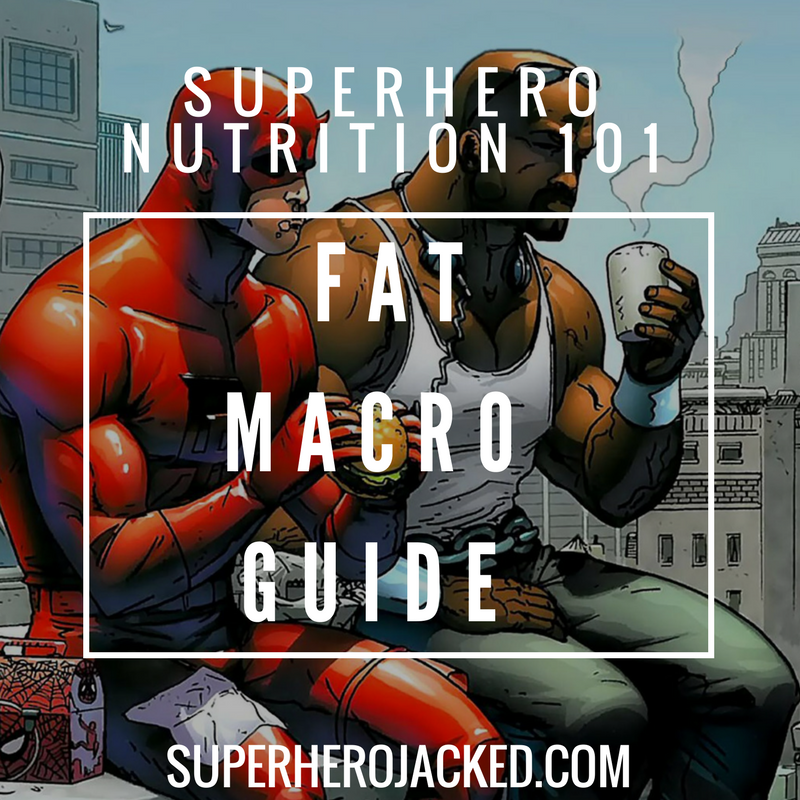Last updated on March 28th, 2020 at 11:11 am
 We’re taking things down to basics and covering what you need to know about macronutrients. Macronutrients, or macros for short, are nutrients that your body needs in large amounts. They also provide calories (energy) to help it run like a well-oiled machine on a day-to-day basis.
We’re taking things down to basics and covering what you need to know about macronutrients. Macronutrients, or macros for short, are nutrients that your body needs in large amounts. They also provide calories (energy) to help it run like a well-oiled machine on a day-to-day basis.
Beginners, this is especially for you, so take notes. Everyone else, feel free to enjoy this refresher as we cover what you need to know about proteins, carbs, and fats!
Fat
I wholeheartedly wish we could use a name other than fat when talking about it as an essential macronutrient. Contrary to popular belief, fat is anything but fattening if it comes from natural sources (like the top five listed at the end of this post). Get your mind out of the gutter of 1980’s low fat craze and take a gander at the following benefits, and functions, of fat:
- Nutrient absorption (in order to be fully absorbed by the body, fat-soluble vitamins like Vitamin A and D should ideally be consumed with a bit of fat; otherwise, you’ll only be cutting yourself short on essential nutrients)
- Energy
- Hormone Production (which include reproductive hormones like Estrogen and Testosterone)
- Controlling inflammation
- Cholesterol balance
- Brain Function
- Mood balance
- Heart protection
- Metabolism
- Cell signaling
- Improving Insulin sensitivity
A lot of these benefits are exclusive only to certain types of fat, which I’ll breakdown as follows:
Monounsaturated Fat (MUFAs)
Liquid at room temperature, may solidify when chilled. Lowers bad cholesterol (LDL) and helps to raise good cholesterol (HDL) in the blood. Protects against heart disease. Helps with body composition and weight balance.
Found in: Avocado, Olives/Olive Oil, Nuts, Eggs, and Red Meat
Polyunsaturated Fat (PUFAs)
Liquid both in room temperature and when chilled. Lowers overall cholesterol level (both LDL and HDL are reduced). Includes two types of essential fatty acids, which cannot be made by the body and must be obtained via diet or supplementation.
These are:
Omega-3 Fatty Acids
Reduces triglycerides (a type of fat) in the blood. Prevents heart disease risk. Lowers inflammation. May decrease inflammation and inflammatory symptoms from conditions/disease like arthritis, ulcerative colitis, and Crohn’s disease. Slows plaque build-up in the arteries.
Found in: Wild-Caught fish- salmon, sardines, mackerel, anchovies, cod liver oils-, grass-fed beef, pasture-raised eggs (contains EPA and DHA, which are the most bioavailable sources) and walnuts, hemp seeds, flax seeds, and chia seeds (these contain ALA; the body converts ALA into EPA/DHA, but the conversion rate is very low).
* Depending on the source, some vegans and authorities in plant based nutrition state that seaweed/algae are a rich plant-based source of EPA/DHA, but the claim is currently up for debate.
Omega-6 Fatty Acids
Controls blood sugar and helps in the prevention of developing diabetes. Lowers blood pressure. Fights inflammation. Reduces heart attack risk. May support healthy bones.
Found in: Nuts and seeds, and vegetable oils. *
*(Omega-6 is not a bad fat, but it’s very high in modern diets filled with processed foods. In excess, Omega-6 can wreak a lot of havoc on the body. Ideally, the diet should contain a healthy 1:1 ratio of Omega-6 to Omega-3.)
Saturated Fat:
Solid at room temperature, liquid in warmer temperatures (i.e., cooking). Makes up to 50% of all cell membranes. Raises good cholesterol (HDL) and changes the particle size of bad cholesterol (LDL) from small and dense (threatening) to large and fluffy (mostly benign). Supports brain health. Balances hormones. Resistant to oxidative damage from high-heat cooking, making them excellent for frying, sautéing, or baking.
Found in: Coconut/Coconut Oil, Palm Oil, Grass-fed Butter and Ghee, Full-Fat Dairy, Eggs, Pork, Beef, and Poultry (dark meat contains higher amounts), and hydrogenated oils in processed foods (obviously these shouldn’t be consumed at all!)*
*(Always consider the source. Saturated fat is completely out of the question if we’re talking about manufactured foods like margarine, chips, desserts, and ready-made meals. The kind found in nature- coconuts, eggs– is very good for you, provided you remember to balance them out with other types of fats- like omega-3 fatty acids– and foods- vegetables, animal/plant-based proteins, etc.)
Trans Fatty Acids
I’m going to keep this one short and sweet. These are your processed, garden-variety of fats that you want to avoid like a vampire hiding out from sunlight. The easiest way to do this is cutting out the crap from your diet. Raid your kitchen of all those boxed sweets, snacks, and ‘sinful’ foods and replace them with things that came around before the rise of machines. Vegan, paleo, vampire, no one wants trans fats in their diet. Just get rid of it.
The Top 5 Fats You Should Consume
Add these to your list the next time you hit the grocery store!
In no particular order:
- Avocado
- Nuts/Seeds
- Coconut Oil
- Wild-Caught Fish (i.e., salmon, sardines, mackerel, tuna)
- Olives/Olive Oil
-Sam
AKA The Dragon
Sources
http://www.fediol.be/web/type+of+fats/1011306087/list1187970123/f1.html
http://www.innerbody.com/nutrition/macronutrients#understanding-fats
http://www.todaysdietitian.com/newarchives/050409p8.shtml
https://medlineplus.gov/ency/patientinstructions/000747.htm
https://www.healthline.com/nutrition/saturated-fat-good-or-bad#section5
Join The Superhero Academy and start unleashing your inner SuperHuman.

SUPERHUMAN SECRETS V.2
NOW UPDATED AND EXPANDED WITH A NEW SECTION & SEVEN BONUSES
USD$29 USD$14.95

